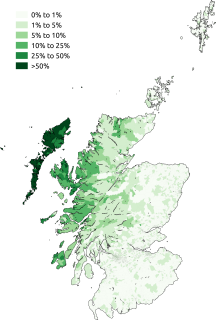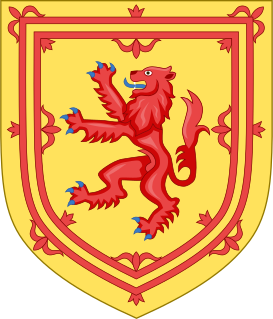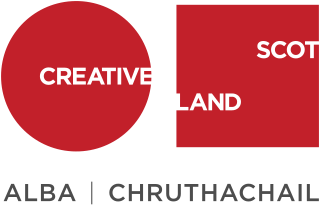
Scotland is a country that is part of the United Kingdom. Covering the northern third of the island of Great Britain, mainland Scotland has a 96-mile (154 km) border with England to the southeast and is otherwise surrounded by the Atlantic Ocean to the north and west, the North Sea to the northeast and the Irish Sea to the south. The country also contains more than 790 islands, principally in the archipelagos of the Hebrides and the Northern Isles. Most of the population, including the capital Edinburgh, is concentrated in the Central Belt – the plain between the Scottish Highlands and the Southern Uplands – in the Scottish Lowlands.

Scottish Gaelic is a Goidelic language native to the Gaels of Scotland. As a Goidelic language, Scottish Gaelic, as well as both Irish and Manx, developed out of Old Irish. It became a distinct spoken language sometime in the 13th century in the Middle Irish period, although a common literary language was shared by Gaels in both Ireland and Scotland down to the 16th century. Most of modern Scotland was once Gaelic-speaking, as evidenced especially by Gaelic-language place names.
NatureScot, which was formerly known as Scottish Natural Heritage, is the public body responsible for Scotland's natural heritage, especially its natural, genetic and scenic diversity. It advises the Scottish Government and acts as a government agent in the delivery of conservation designations, i.e. national nature reserves, local nature reserves, national parks, Sites of Special Scientific Interest (SSSIs), Special Areas of Conservation, Special Protection Areas and the national scenic areas. The protected areas in Scotland account for 20% of the total area, SSSIs alone 13%. NatureScot receives annual funding from the Government in the form of Grant in Aid to deliver Government priorities for the natural heritage.

Cromarty is a town, civil parish and former royal burgh in Ross and Cromarty, in the Highland area of Scotland. Situated at the tip of the Black Isle on the southern shore of the mouth of Cromarty Firth, it is 5 miles (8 km) seaward from Invergordon on the opposite coast. In the 2001 census, it had a population of 719.

English, in various dialects, is the most widely spoken language of the United Kingdom, but a number of regional languages are also spoken. There are 14 indigenous languages used across the British Isles: 5 Celtic, 3 Germanic, 3 Romance, and 3 sign languages: 2 Banszl and 1 Francosign language. There are also many languages spoken by people who arrived more recently in the British Isles, mainly within inner city areas; these languages are mainly from South Asia, Eastern and Western Europe.

Campbeltown is a town and former royal burgh in Argyll and Bute, Scotland. It lies by Campbeltown Loch on the Kintyre peninsula. Originally known as Kinlochkilkerran, it was renamed in the 17th century as Campbell's Town after Archibald Campbell was granted the site in 1667. Campbeltown became an important centre for Scotch whisky, and a busy fishing port.
Michael Bruce Forsyth, Baron Forsyth of Drumlean, PC is a British financier and Conservative politician, who was the Member of Parliament (MP) for Stirling from 1983 to 1997 and served in the cabinet of John Major as Secretary of State for Scotland from 1995 to 1997.
Janet Ray Michie, Baroness Michie of Gallanach was a Scottish speech therapist and Liberal Democrat politician. She served as Member of Parliament (MP) for Argyll and Bute for 14 years, from 1987 to 2001, and then became a life peer in the House of Lords. She was the first peer to pledge the oath of allegiance in the House of Lords in Gaelic.

Comhairle nan Eilean Siar is the local government council for Na h-Eileanan Siar council area of Scotland. It is based in Stornoway in the Isle of Lewis.

Anne Lorne Gillies is a singer, writer and Gaelic activist. She is a classically trained musician and a professional singer/songwriter. She was born in Stirling in 1944, and raised on a croft in Argyll from the age of five.
The BBC Trust was the governing body of the British Broadcasting Corporation (BBC) between 2007 and 2017. It was operationally independent of BBC management and external bodies, and its stated aim was to make decisions in the best interests of licence-fee payers. On 12 May 2016, it was announced in the House of Commons that, under the next Royal Charter, the regulatory functions of the BBC Trust were to be transferred to Ofcom.
James Boyle was Chairman of the National Library of Scotland until 2016, Chairman of the British Council in Scotland and was formerly Chairman of the Scottish Arts Council, Chairman of the Scottish Government's Cultural Commission, Controller of BBC Radio 4, Head of BBC Radio Scotland and co-founder of the UNESCO World City of Literature and World City of Music Programs. He has also served on the board of Napier University and as a UK Civil Service Commissioner. He was educated at the University of Strathclyde and the University of East Anglia.

BBC Alba is a Scottish Gaelic-language free-to-air television channel jointly owned by the BBC and MG Alba. The channel was launched on 19 September 2008 and is on-air for up to seven hours a day with BBC Radio nan Gàidheal simulcasts. The name Alba is the Scottish Gaelic name for Scotland. The station is unique in that it is the first channel to be delivered under a BBC licence by a partnership and is also the first multi-genre channel to come entirely from Scotland with almost all of its programmes made in Scotland.

The Scottish Poetry Library was founded in 1984 by poet Tessa Ransford. The present Director, Asif Khan, was appointed from June 2016. Khan is supported by a dedicated team of librarians and specialist staff with expertise in collections management, engagement, learning, events, publishing and communications.

The Commission on Scottish Devolution, also referred to as the Calman Commission or the Scottish Parliament Commission or Review, was established by an opposition Labour Party motion passed by the Scottish Parliament on 6 December 2007, with the support of the Conservatives and Liberal Democrats. The governing Scottish National Party opposed the creation of the commission.

Creative Scotland is the development body for the arts and creative industries in Scotland. Based in Edinburgh, it is an executive non-departmental public body of the Scottish Government.
The Royal Commission on Local Government in Scotland, usually called the Wheatley Commission or the Wheatley Report, was published in September 1969 by the chairmanship of Lord Wheatley. Its recommendations led to a new system of regional and district councils, introduced in 1975 by the Local Government (Scotland) Act 1973.
The Scottish Digital Network (SDN) is a planned new public service broadcaster and online services provider in Scotland. It was the principal proposal of the Scottish Broadcasting Commission. The Scottish Broadcasting Commission published its final report in September 2008, with this as its primary recommendation. On 13 September 2010 the Minister for Culture and External Affairs, Fiona Hyslop, requested Blair Jenkins, who had been the chair of the Scottish Broadcasting Commission to actively explore proposed options and business models for the establishment of a Scottish digital network to compete in public service broadcasting with the BBC Network in Scotland. On 21 March 2013, three bidders were announced as the finalists for the Scottish Wide Area Network (SWAN). They were British Telecom, a partnership of Cable & Wireless Worldwide with Virgin Media Business and Capita with Updata Infrastructure.

Alba is the Scottish Gaelic name for Scotland. It is cognate with the Irish term Alba and the Manx term Nalbin, the two other Goidelic Insular Celtic languages, as well as contemporary words used in Cornish and Welsh, both of which are Brythonic Insular Celtic languages. In the past these terms were names for Great Britain as a whole, related to the Brythonic name Albion.











